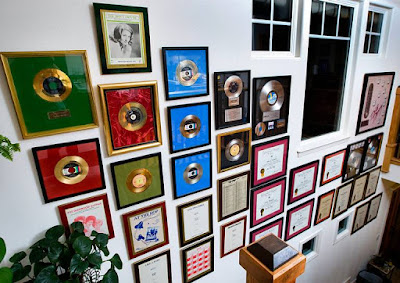Clinton Eastwood Jr. (born May 31, 1930) is an American motion-picture actor who emerged as one of the most popular Hollywood stars in the 1960s and went on to become a prolific and respected director-producer.
During the Great Depression, Eastwood moved with his family a number of times before they finally settled in Piedmont, California, in 1940. He was drafted during the Korean War and stationed in California. Following his discharge from the army in 1953, Eastwood moved to Hollywood. A screen test with Universal in 1954 netted him a 40-week contract, but, after one renewal and a series of bit parts in such movies as Tarantula (1955) and Revenge of the Creature (1955), his option was dropped. He appeared in several TV series before he got his big break in 1959 by being cast as Rowdy Yates in the popular TV western Rawhide (1959–65).
 |
| Clint Eastwood & Nina Foch |
Clint Eastwood’s singing career goes nearly as far back as his acting career. He tried to capitalize on Rawhides fame by recording an album. Thus was born Rawhide’s Clint Eastwood Sings Cowboy Favourites, which is exactly as advertised, though with a little more tremolo than you might expect from this particular cowboy. Eastwood had played piano for years, and practiced his croon as part of his time at Universal Studios’ talent school, but as a singer, vibrato and all, he “wasn’t earthshaking,” as one Eastwood biography kindly put it, but Eastwood continued anyway, releasing a number of singles such as “Unknown Girl,” in 1961.
Eastwood achieved international stardom during this same period when he played The Man with No Name—a laconic, fearless gunfighter whose stoicism masks his brutality—in three Italian westerns (popularly known as “spaghetti westerns”) directed by Sergio Leone: 1964; A Fistful of Dollars, 1965; For a Few Dollars More and 1966; The Good, the Bad and the Ugly. In 1967 the three films played in the United States and were immediate commercial successes, establishing Eastwood as a box-office star.
For Eastwood’s first American western, Hang ’Em High (1968) he formed his own production company, Malpaso. He also worked with Don Siegel on the popular police story Coogan’s Bluff (1968); it was Siegel who taught him most of what he needed to know about directing, a debt Eastwood often acknowledged. He also worked with Siegel on Dirty Harry (1971), in which Eastwood first portrayed the ruthlessly effective police inspector Harry Callahan. The film proved to be one of Eastwood’s most successful, spawning four sequels and establishing the no-nonsense character Dirty Harry—known for such catchphrases as “Go ahead, make my day”—as a cinema icon.
Eastwood turned to directing films in which he also played
leading roles. He took over the western The Outlaw Josey Wales (1976) from
Philip Kaufman, who cowrote the story of a Missouri farmer driven to violence
after his family has been slaughtered by renegade Union soldiers. Stylishly
photographed by Bruce Surtees, with a fine performance by Chief Dan George as a
Cherokee elder, this work humanized Eastwood’s mythic avenger archetype for the
first time. The biggest hit of Eastwood’s five-decade singing career, “Bar Room
Buddies” took him all the way to No. 1 on the Hot Country Singles chart in
1980.
Having wandered rather far afield from his star action persona, Eastwood directed the fourth Dirty Harry film, Sudden Impact (1983). He then returned to his screen roots with the neo-mythic Pale Rider (1985). It showcased Eastwood’s iconic presence and Surtees’s gorgeous photography and was one of the few hit westerns of the 1980s.A lifelong devotee of jazz and an accomplished pianist, Eastwood also directed the well-regarded Bird (1988), a film biography of saxophonist Charlie Parker (Forest Whitaker), and produced the documentary Thelonious Monk: Straight, No Chaser (1988). Off-screen, Eastwood made national headlines in 1986 when he was elected mayor of Carmel, California; he served for two years.
Among several other mid- and late-career Eastwood gems are the elegiac multiple Oscar-winning revisionist Western Unforgiven (1992), Bridges of Madison Country (1995), Mystic River (2003), the poignant boxing drama Million Dollar Baby (2004), and American Sniper (2014).
As you will note I have not named all of Clint’s films as I like to keep each post to no more than about 800 words and there are plenty of great web sites where you can find more information. At a time when most new Hollywood releases are on hold or mired in mediocrity, the prospect of another power-packed Eastwood picture making it to the cinemas is cause for celebration. It’s about time that the nonagenarian maestro is declared a national treasure.
Besides his Academy Awards, Eastwood received the Irving G. Thalberg Award for lifetime achievement in 1995 and the American Film Institute’s Life Achievement Award in 1996. In 2007 he was made a chevalier of the French Legion of Honour; he was elevated to commander two years later.
(Edited from Britannica, Scroll.in & Slate.com)


















































